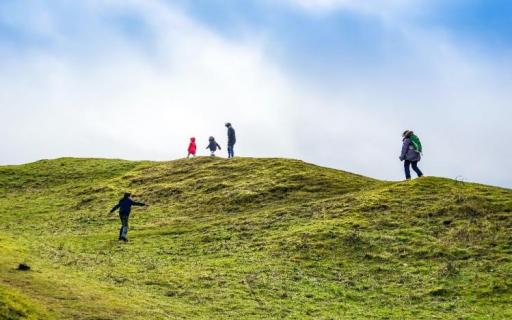Education for Sustainability (EfS) empowers learning communities with the values, knowledge, and skills they need to take meaningful action to ensure a thriving world.
This website provides the rationale for EfS, celebrates learner outcomes, discusses teaching pedagogies, and describes the ways in which EfS can inform a whole-school approach to creating a more sustainable world.
EfS curriculum, pedagogies, and assessment
The flexibility of The New Zealand Curriculum allows schools to design a local curriculum that is relevant for their ākonga and community. EfS can be used to design a strong, integrated local curriculum that provides many opportunities for ākonga to become confident, connected, and actively involved lifelong learners.
EfS can be integrated into a multitude of meaningful learning contexts, issues, and community projects. It can draw on, and weave together, knowledge from every learning area. Education for Sustainability is relevant and accessible for ākonga at all levels of the New Zealand Curriculum.
Curriculum approaches in EfS
Education for Sustainability addresses complex issues that intersect environmental, social, cultural, and economic perspectives. Through EfS, ākonga will learn how to draw skills and knowledge from more than one learning area in order to fully investigate their world.
Curriculum integration is an appropriate approach for examining issues within Education for Sustainability. Teachers can use an integrated curriculum to develop learners’ action competence through inquiry, as described below. Resources such as Pūtātara provide examples of how inquiry and curriculum integration can be incorporated to investigate issues of sustainability.
Further guidance on designing local curriculum and effective integrated curriculum approaches to EfS can be accessed via centrally funded professional learning and development channels or programmes such as Enviroschools.
Pedagogical approaches to support EfS
Evidence suggests that effective Education for Sustainability practices develop learners’ action competence. As Eames et. al (2009) outline, action competence empowers and mobilises ākonga in “intentional, participatory and authentic action taking” in response to knowledge that is acquired through inquiry and experience.
Action competence is further guided by learners’ own values and local contexts. It responds to the three transformative competencies outlined in the OECD Learning Compass 2030, which are creating new value, reconciling tensions and dilemmas, and taking responsibility.
An action competence approach to EfS provides a backbone for knowledge-rich, action inquiry and a broad sense of potential learner outcomes within EfS.
Exploring, uncovering connectedness, and illuminating the unknown
This first step in any EfS inquiry sees teachers create opportunities for ākonga to get curious by exploring multiple perspectives, engaging in the context, and identifying the complexities of an issue from different points of view.
Through discovery, ākonga will:
- use mātauranga Māori as the launchpad from which to understand their relationship to Papatūānuku, and to each other, within Aotearoa
- engage in a range of experiences to develop understanding of and commitment to sustainability issues
- develop skills of empathy, solidarity, and respect for diversity
- create safe spaces for sharing opinions, debating respectfully, and resolving conflict
- learn in the natural environment so that enduring connections with place develop
- within the discovery, engage their "head, heart, and hands", so that they can think feel, and act for a sustainable world
- develop understandings of the inextricable connections between ourselves, each other, and the natural world.
Developing conceptual and practical understanding of sustainability and climate change issues
Teachers create opportunities for ākonga to gather and interpret the insights they have gained from the discovery phase.
Through integrating knowledge, ākonga will:
- develop knowledge and understanding of everyday sustainability issues, and their impact on all living things
- find and analyse scientific information alongside social, cultural, and historical views
- consider multiple ways of knowing and exploring diverse perspectives or value positions
- acquire knowledge of local and global issues and the connections between them in Aotearoa New Zealand and the Pacific
- examine and critique current societal norms and practices, developing their own values that will guide them as citizens going forwards
- consider the complex challenges of sustainability, and how they can address them.
Mapping and implementing the changes that are needed now for the future that we hope for
Teachers create opportunities for ākonga to meaningfully act on the issues of sustainability they have been investigating.
Through action for a sustainable future, ākonga will:
- develop a vision for a sustainable future, and identify actions that can be taken now to help achieve this
- design local responses to global sustainability issues, with a focus on positive, regenerative change
- collaborate with others to make a difference, including peers, teachers, school leaders, whānau, and community
- be involved in addressing real issues in real-time
- be visible as change agents in relation to local environmental issues
- be enabled and empowered, knowing they can make a difference.
Analysing your experiences and impact through reflective critical thinking
Teachers create opportunities for ākonga to reflect on their experiences throughout the inquiry.
Through reflection, ākonga will:
- make connections between thinking, feeling, and acting
- articulate the ways in which they have learned through taking action on sustainability and climate change issues
- reflect on the impacts of their actions, the success of their actions, and the ways this could evolve, change, or grow
- be able to celebrate the changes that result from their work in the local environment, school, or community.
Assessment for EfS learning
Assessment, teaching, and learning all inform each other. Effective assessment ensures that EfS learning experiences develop knowledges, skills, and understanding of the New Zealand Curriculum, and prepare young people to actively contribute to a more sustainable world.
When planning for EfS, it is important to consider the ways that evidence of EfS learning can be evidenced. A good starting point is to look at the objectives within each of the pedagogical approaches. Examine each objective in relation to your planning and ask:
- In what ways will we ensure there are teaching and learning opportunities that will develop this aim?
- In what ways will it be evident, to both teacher and ākonga, that learning has taken place in relation to this aim?
It will often be appropriate for ākonga to work with you to define what success will look like, how they too will know what learning has taken place, and what they will do to evidence their journey.
Evidence demonstrates a learner’s achievement of a shared understanding of the learning. Evidence of learning may build up over time and can be shown in a number of ways – such as written work, observation, a conversation between ākonga and teacher, or demonstrated in practice. Evidence of learning may come from external sources that show the impact of EfS activities, such as from community voice or a survey.
Building close links between the learning process and formative assessment allows teachers to consider next steps and potential areas for growth and development. Within EfS it is important that assessment is not reductive but records the broad intentions and real-world impact of EfS teaching and learning. Evidence of learning needs to be gathered and used in a way that supports progress within EfS learning over time.
Resources
Pūtātara: A call to action
Incorporating sustainability and global citizenship across the curriculum in Aotearoa New Zealand, this resource supports schools and teachers to develop learning opportunities that are place-based, inquiry-led, and focused on participation for change.
Science Learning Hub
The Science Learning Hub | Pokapū Akoranga Pūtaiao links New Zealand scientists with school students, teachers, and community audiences to showcase examples of New Zealand science, technology, and engineering. There are a range of resources on sustainability and climate change.
Image rights: Algalita Marine Research and Education
Enviroschools
Through Enviroschools, ākonga connect with and explore the environment, then plan, design and take action in collaboration with their communities. The Enviroschools programme uses a whole-school approach to ensure that the whole school is ‘walking the talk’ on sustainability. To join the programme and access a range of resources, contact your local Regional Coordinator.
A framework for developing action competence (EfS): Teacher guide Dr C. Eames (2010)
This teacher guide accompanies A framework for developing action competence in EfS: Facilitator guide. The framework is a means of promoting discussion within a school and for scaffolding teaching and learning to develop action competence in Education for Sustainability.







